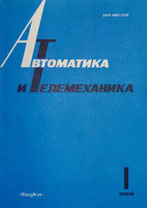|
This article is cited in 2 scientific papers (total in 2 papers)
Control in Technical Systems
Enhancing the energy efficiency of dense Wi-Fi networks using cloud technologies
A. G. Kiryanova, A. V. Krotova, E. M. Khorova, I. F. Akyldizab
a Kharkevich Institute for Information Transmission Problems,
Russian Academy of Sciences, Moscow, Russia
b Georgia Institute of Technology, Atlanta, Georgia, USA
Abstract:
In the modern world, the Wi-Fi technology is undoubtedly one of the leaders in the field of wireless communications. Increasing density of devices in Wi-Fi networks and increasing number of the networks themselves have led to high interference and, as a result, to a decrease in the performance of Wi-Fi networks. One effective solution to reduce interference in dense deployment scenarios is the use of cloud-based management systems. In this work, we present an algorithm for centralized Wi-Fi network management for such a cloud-based system. The algorithm aims to maximize energy efficiency by solving an optimization problem with constraints where it is necessary to maximize the difference between two monotonic functions. Validation and evaluation of the effectiveness of the developed algorithm has been carried out in the NS-3 simulation environment.
Keywords:
energy efficiency, Wi-Fi, 802.11ax, dense networks, optimization, cloud technologies.
Citation:
A. G. Kiryanov, A. V. Krotov, E. M. Khorov, I. F. Akyldiz, “Enhancing the energy efficiency of dense Wi-Fi networks using cloud technologies”, Avtomat. i Telemekh., 2020, no. 1, 117–133; Autom. Remote Control, 81:1 (2020), 94–106
Linking options:
https://www.mathnet.ru/eng/at15297 https://www.mathnet.ru/eng/at/y2020/i1/p117
|

| Statistics & downloads: |
| Abstract page: | 193 | | Full-text PDF : | 32 | | References: | 25 | | First page: | 16 |
|




 Contact us:
Contact us: Terms of Use
Terms of Use
 Registration to the website
Registration to the website Logotypes
Logotypes








 Citation in format
Citation in format 
